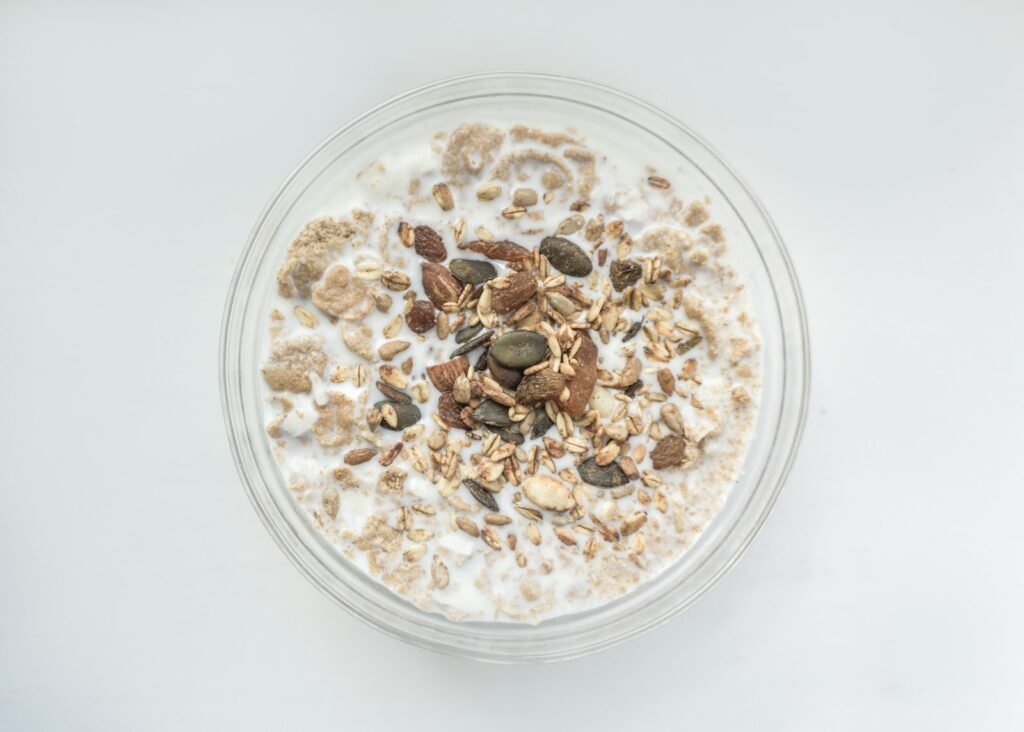Starting your day with a heart-healthy breakfast can set the tone for better eating habits and improved cardiovascular health. A nutritious morning meal can help lower cholesterol and provide essential nutrients to support your heart.
You might think that preparing a heart-friendly breakfast is time-consuming, but there are many quick and easy options available. Heart-healthy breakfast recipes can be ready in just 15 minutes or less, making them perfect for busy mornings. These meals are typically low in saturated fat and sodium, which are key factors in maintaining good heart health.
By choosing the right breakfast foods, you can start your day feeling energized and confident that you’re taking care of your heart. From smoothies to egg dishes, there are plenty of tasty options that fit into a heart-healthy eating plan. Let’s explore some ideas that will make your morning routine both delicious and beneficial for your heart.
The Cornerstones of a Heart-Healthy Breakfast
A heart-healthy breakfast starts with the right mix of nutrients. You’ll want to focus on fiber, whole grains, and healthy fats to keep your heart in top shape.
Understanding Nutritional Content
When planning your breakfast, pay attention to key nutrients. Look for foods low in saturated fat and cholesterol. These can raise your LDL cholesterol, which is bad for your heart. Instead, choose options high in fiber and protein.
Aim for a balance of carbs, proteins, and fats. Carbs give you energy, proteins help you feel full, and fats support nutrient absorption. Good choices include:
- Oatmeal with nuts and berries
- Whole grain toast with avocado
- Greek yogurt with fresh fruit
Remember to watch portion sizes. Even healthy foods can add up if you eat too much.
The Role of Fiber and Whole Grains
Fiber and whole grains are key for heart health. They help lower cholesterol and keep you feeling full. Aim for at least 25-30 grams of fiber per day.
Good sources of fiber include:
- Oats
- Whole wheat bread
- Bran cereal
- Fruits like apples and pears
Whole grains offer more nutrients than refined grains. They keep the bran and germ, which have fiber, vitamins, and minerals. Try swapping white bread for whole wheat or white rice for brown rice.

Adding just one serving of whole grains to your breakfast can make a big difference. It’s an easy way to boost your heart health.
Incorporating Healthy Fats
Not all fats are bad for your heart. Healthy fats can actually help protect it. Omega-3 fatty acids are especially good. They can lower your risk of heart disease.
Good sources of healthy fats for breakfast include:
- Nuts and seeds
- Avocado
- Olive oil
- Fatty fish like salmon
These foods also provide vitamin E, which is an antioxidant. It helps protect your cells from damage.
Try adding a handful of walnuts to your oatmeal or spreading avocado on your toast. Small changes like these can make your breakfast more heart-healthy.
Delicious and Nutritious Breakfast Recipes
Start your day with tasty meals that support heart health. These recipes blend flavor and nutrition, offering quick options, weight-friendly choices, and fresh takes on classic breakfasts.
Quick and Easy Breakfast Ideas
Pressed for time? Try two-ingredient banana pancakes. Mix mashed banana with eggs, cook on a griddle, and top with berries for a fast, protein-rich meal.
Overnight oats are another time-saver. Combine oats, milk, and your favorite fruits in a jar before bed. By morning, you’ll have a creamy, fiber-packed breakfast ready to go.
For a savory option, whip up everything bagel avocado toast. Mash avocado on whole-grain toast, sprinkle with everything bagel seasoning, and add a soft-boiled egg for extra protein.
Breakfast for Weight Management
Start your day with protein-rich meals to feel full longer. Greek yogurt parfaits are a great choice. Layer Greek yogurt with fresh berries and a sprinkle of low-fat granola for crunch.
Smoothie bowls offer endless variety. Blend frozen fruits with spinach and a liquid base, then top with nuts and seeds for healthy fats and extra nutrients.
Sweet potato hash is a filling option. Dice and roast sweet potatoes with bell peppers and onions. Serve with a poached egg for a balanced meal that keeps you satisfied until lunch.
Creative Twists on Traditional Breakfast
Shake up your routine with a breakfast salad. Top mixed greens with a soft-boiled egg, avocado slices, and cherry tomatoes. Dress with olive oil and lemon juice for a light, refreshing start.
Try a savory oatmeal bowl. Cook steel-cut oats in low-sodium broth, then add sautéed mushrooms, spinach, and a sprinkle of Parmesan cheese.
For a sweet treat, make whole-grain waffles topped with Greek yogurt and fresh peach slices. This gives you the comfort of waffles with added protein and fiber to keep your heart happy.

Heart-Healthy Ingredients to Keep in Your Pantry
Stocking your pantry with heart-healthy ingredients makes it easier to prepare nutritious meals. You’ll find options that support cardiovascular health and taste great too.
The Importance of Whole Grains and Nuts
Whole grains are packed with fiber, which helps lower cholesterol. Keep oats for overnight oatmeal in your pantry. They’re versatile and filling. Whole-grain bread is perfect for toast or English muffins.
Nuts offer healthy fats and protein. Almonds, walnuts, and pecans make great snacks or toppings. Try adding them to baked banana-nut oatmeal cups for a tasty breakfast.
Look for items without added sugars. Read labels carefully to avoid hidden unhealthy ingredients.
Selecting Dairy and Non-Dairy Alternatives
Greek yogurt is a protein-rich option that keeps well in the fridge. It’s great for breakfast or as a snack. Choose low-fat versions to limit saturated fat.
For non-dairy options, almond milk is a good choice. It’s low in calories and often fortified with vitamins. Check that it’s unsweetened to avoid extra sugar.
Canned salmon is rich in omega-3 fatty acids. It’s an easy way to add heart-healthy protein to meals. Keep a few cans on hand for quick lunches or dinners.
Balancing Your Breakfast Plate
A heart-healthy breakfast starts with the right mix of foods. You can create a nourishing morning meal by including protein sources and colorful fruits and vegetables.
Protein-Packed Mornings
Start your day with protein-rich options to keep you full and energized. Scrambled eggs are a classic choice, packed with nutrients. For a twist, try an egg tartine on whole-grain toast.
Peanut butter is another great protein source. Spread it on apple slices or whole-grain toast for a quick, satisfying breakfast. Greek yogurt topped with nuts and seeds also provides a protein boost.
Plant-based options like tofu scrambles or bean-based breakfast burritos can be equally filling. These choices help maintain steady blood sugar levels and support heart health.
Fruits and Vegetables for Breakfast
Adding fruits and veggies to your breakfast boosts fiber, vitamins, and minerals. Try a strawberry peach smoothie for a refreshing start. Blend in spinach or kale for extra nutrients without changing the taste much.
Top your oatmeal or yogurt with berries, sliced bananas, or diced apples. These add natural sweetness and important antioxidants. For a treat, make blueberry pancakes using whole-grain flour and fresh or frozen berries.
Vegetables can fit into breakfast too. Add spinach or tomatoes to your eggs, or try a veggie-packed omelet. Sliced avocado on toast provides healthy fats and makes a filling meal.
Tips for Maintaining a Heart-Healthy Breakfast Routine
Planning your meals and practicing mindful eating can help you stick to a heart-healthy breakfast routine. These habits make it easier to choose nutritious foods and enjoy your meals.
Meal Planning and Preparation
Start by making a weekly meal plan. Choose heart-healthy breakfast ideas that fit your schedule and tastes. Stock up on nutritious ingredients like whole grains, fruits, and lean proteins.
Prep ingredients in advance to save time. You can:
- Wash and chop fruits and vegetables
- Cook whole grains in batches
- Portion out nuts and seeds
Try making healthy muffins with whole grain flour and fruits. Freeze them for quick, ready-to-eat breakfasts.
Keep a variety of options on hand to prevent boredom. Mix up your choices between hot and cold meals, sweet and savory flavors.
Mindful Eating Habits
Focus on your meal without distractions. Turn off the TV and put away your phone. This helps you enjoy your food and recognize when you’re full.
Eat slowly and chew thoroughly. This improves digestion and helps you feel more satisfied. Try putting your fork down between bites.
Pay attention to portion sizes. Use smaller plates to help control serving amounts. Fill half your plate with fruits or vegetables.
Listen to your body’s hunger cues. Eat when you’re hungry, not just because it’s “breakfast time”. If you’re not hungry right away, it’s okay to wait a bit.
Try new heart-healthy recipes to keep things interesting. Experiment with different fruits, whole grains, and protein sources to find combinations you enjoy.
Frequently Asked Questions
Heart-healthy breakfast options can help start your day right. They provide good nutrition and energy while supporting your cardiovascular health. Let’s explore some common questions about heart-friendly morning meals.
What are some heart-healthy breakfast options recommended by the American Heart Association?
The American Heart Association suggests several nutritious breakfast ideas. You can try whole grain muffins with fruits or vegetables. Greek yogurt with berries and nuts is another good choice. Oatmeal topped with fresh fruit and a sprinkle of cinnamon also makes a tasty, heart-healthy meal.
How can one incorporate heart-healthy foods into breakfast for weight loss?
To support weight loss and heart health, focus on fiber-rich foods. Choose whole grains like oats or whole wheat toast. Add plenty of fruits and vegetables to your breakfast. Lean proteins such as egg whites or low-fat Greek yogurt can help you feel full longer.
What are quick and easy heart-healthy breakfast ideas suitable for busy mornings?
For busy mornings, try smoothies made with fruits, vegetables, and low-fat yogurt. Overnight oats prepared the night before are another time-saver. You can also make a quick sandwich with whole grain bread, avocado, and a hard-boiled egg.
How can eggs be prepared as part of a heart-healthy breakfast?
Eggs can be part of a heart-healthy diet when prepared wisely. Try scrambled egg whites with vegetables. You can also make a veggie-packed omelet using one whole egg and extra whites. Poached or hard-boiled eggs on whole grain toast with avocado is another good option.
What are heart-healthy breakfast proteins for a balanced diet?
Good protein choices for a heart-healthy breakfast include Greek yogurt, egg whites, and nuts. You can also try low-fat cottage cheese or plant-based options like tofu scramble. Nut butters spread on whole grain toast provide protein and healthy fats.
Which breakfast foods are considered the healthiest for maintaining good heart health?
Oatmeal is a top choice for heart health. It’s high in fiber and can help lower cholesterol.
Berries are rich in antioxidants that support heart health. Meanwhile, nuts and seeds provide healthy fats and protein. Whole grain breads and cereals offer fiber and nutrients. Lastly, low-fat dairy or fortified plant-based alternatives can also be part of a heart-healthy breakfast.





